 Happy Earth Day everyone! I love this day and wish we could make the efforts we put into this one day happen, well, every day. It's been amazing to see so many people using social media to share their plans for Earth Day. Even better is to see so many people getting outdoors and doing something to help protect our precious planet. From cleaning up litter around your neighbourhood to conserving energy and eliminating use of plastic bottles -- it all adds up! So thank you for making a difference. I'm also so excited to share that I'm presenting at an elementary school in our community this week. I'll be sharing my stories about resiliency and times I've failed and how important it is to never give up. I've learned that the brain is like a muscle and the more we exercise it, the stronger it gets. We learn the most from the mistakes we make. Sharing our mistakes with others might just be what someone else needs to overcome their fear as you inspire and motivate them with your courage to keep going. We might not know how to do something now, but it is just a matter of time if you believe in yourself and give yourself time to learn. By adding the word "yet" to the end of a sentence, you can change your entire mindset in a really great way. Instead of saying that you can't do something, try saying, "I can't do _____ yet!" It makes all the difference. I'm also a huge Star Wars fan and I love this movie clip where Yoda gives Luke Skywalker and important pep talk. Luke had a fixed mindset and Yoda asks him to unlearn what he has learned and that he can do whatever he makes his intention. May the force of the power of the word YET be with you!
0 Comments
 When I started my ocean warrior journey at age 6, I discovered lots of things about the ocean, marine animals, and pollution. I also learned about people's behaviour and more specifically, their fears along with something called stigma. Although I didn't have the word stigma as part of my vocabulary then, I felt afraid of things that I didn't understand. I was afraid of sharks. I spent time on the National Geographic Kids website and one day decided to move to the section where they featured sharks. I was afraid, but something in me decided to read about them. Once I took that step, I learned all about sharks and soon realized that they fascinated me. The more I read, the more I realized that my fear was an uneducated one. It was based on assumptions and misinformation. It was based on what the movies like Jaws wanted to create -- that sharks were monstrous killing machines. This isn't the case. I've included a link to an interview by the author of Jaws book, Peter Benchley. The ah-ha moment for me to overcome my fear was education. It was the ability to gain an open mind and a different perspective because I was willing to become informed and there were people in the world who inspired me and encouraged me to learn and deepen my understanding. It isn't that stigma doesn't exist, but rather that through education, we can help people eliminate misperceptions and misinformation. I also believe there are many stigmas in life and some we seem to accept as societal norms, you know, the things that we just accept because people say it is so and share their misperceptions with us. Stigma is negative behaviour or a negative attitude toward something or some person. In my research, I've found stigma about certain marine animals like sharks. I've also seen stigma regarding activism and conservation. For some, it makes them uncomfortable because they feel forced to face a problem that doesn't really affect them -- or at least they don't think it does or will. Some people don't believe that there is climate change or that the ice caps are melting or that animals are becoming extinct because of human mistreatment or apathy. I've also seen stigma with people issues. People are afraid of certain medical conditions like HIV/AIDS, colon cancer, leprosy and mental illness. In schools, kids deal with physical, mental and cyber bullying. They also deal with gender issues and language barriers, religious differences and learning disabilities. Misperceptions and misinformation exist where stigma thrives. Stigma stifles a kid's willingness to come forward and share their story. Stigma keeps kids suffering in silence. We can change stigma by knowing what to do and what to say. Whether is involves animals, our planet or the people who inhabit it, we have the ability to make a difference. It starts with education and the willingness to open our mind to new ideas. When we're informed, we build the confidence to listen and to ask how we can help make a positive difference whether it involves picking up garbage, recycling, or actively listening to a friend's story without judgement. There are steps you can take to help stomp out stigma. (source: mendthemind.ca) 1) Educate yourself. When you know the facts, you're better able to tackle your fear; 2) Be mindful of what you say and the attitudes and behaviour you have toward a topic you fear; 3) Help educate others so that they are better equipped to stomp out fear-based stigma; 4) Focus on what you can do to make something better. Stay hopeful; 5) Be supportive and inclusive. Picture yourself in the situation and imagine how you'd like to be treated. Every effort, even the smallest is helpful in dealing with stigma. Believe that you can make a difference regardless of whether you see the results of your efforts. Sometimes it comes down to planting seeds for a garden you'll never get to see bloom. If you didn't plant the seeds, there wouldn't be a garden for others to enjoy.  On April 8, the Waterloo Region District School Board's Parent Involvement Committee in conjunction with WRAPSC volunteers organized a free community conference based on the theme of empowering students with parent engagement. For the first time ever, I presented with my mom, Susan. We had an awesome time sharing with a community audience that attended our two 90 minute sessions called, Nurturing Children's Interests. I know how important it is to have my mom's ongoing support for everything that I've been interested in. Having the chance to talk about what I've been able to do with my passion for ocean conservation and endangered marine animals since I started down this path at age 6 has been really something super fun and rewarding. During our sessions, I noticed a reoccurring theme -- parents commented that their children might be spending too much time with technology - iPads, tablets, smartphones, video games. "They should be doing something else." and "What can we do to help them get away from technology?" There is a fine line between spending to much time doing any one activity. We invited attendees to watch or join in with their child to see and experience what held their interest so much. We also asked parents to talk to their children in age appropriate ways to learn about time management and prioritization. There can be time for video games and other leisure activities once the daily tasks and homework are complete. These messages support the development of important life skills. While some parents might struggle with how much their kids are using technology, there are many great ways to use it for learning opportunities. There are helpful websites such as FunBrain.com that provide online educational games. There are many YouTube video such as KhanAcademy.org to help you learn anything! I know that my research on the website kids.nationalgeographic.com has been instrumental in fostering what I know about marine and ocean conservation. Technology is here to stay. There are good aspects to it as well as some that can prove quite harmful. It is all about understanding and finding the balance that works for your child and for your family. Expressing your concerns to your child in age appropriate ways can start an important conversation that prevents kids from shutting down or feeling rejected. Who knows, you may find some of these websites of interest too! Keep the conversation going and be aware of judging statements and presenting your agenda instead of listening and asking questions. You never know where a child's interest may lead them. Anything is possible. Keep believing because children are not only our future, but they are our present. 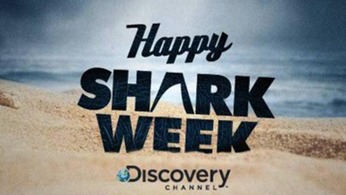 It’s the most wonderful time of the year… Shark Week! Now a world wide phemomenon, everyone settles around the TV to learn about sharks. I’m so glad that we have a week to raise awareness and celebrate these amazing creatures! In the spirit of Shark Week here are some fun facts you probably didnt know about sharks: 1)What a mom! Whale Sharks can give birth to over 300 pups, this is huge compared to other species will that will have less than five. 2) Talk about an old movie! Sharks only have a single type of ‘cone’ photoreceptors, which means they see the world in black and white. 3) The grandpa’s of the ocean!These under water fishies have been on this planet for over 400 million years, the earliest sharks were found in the Devonian age! 4) Just keep swimming, swimming, swimming. Many species of shark will die if stop moving.This is the case for great whites and mako sharks, they don’t have the muscles to pump water into their mouthes and over their gills. It is neccesary for them to constantly swim to survive. 5) Grease Monkeys! Sharks livers have massive amounts of oil, this makes their organ buoyant and helps sharks balance under water. 6) Did you know that bamboo shark pups imitate the appearance of dangerous sea snakes to scare away predators? That’s one smart baby. 7) Prowlers of the night! Sharks have the best night vision due to a membrane at the back of the eye, which makes them more perceptive to light. 8) Just like trees, you can tell how old a shark is by counting the rings on the vertebrae! 9) What a nose! Sharks can smell a single drop of blood in 1 million drops of water. 10) Unlike most sharks, great whites are warm blooded, and need to constantly eat meat to maintain its temperature. So not such a cold blooded killer after all... Now that we know these cool facts maybe we can learn to change our perspective. So that sharks aren't just evil killing machines, but humble majestic fish, that are pretty darn awesome. We need to actively use our compassion, to save this species so that we don't become those malicious murderers. It is time for humans to step up and make a difference. For our oceans and sharks, happy shark week.  On May 13th I visited Avon Maitland Public School and I met many student leaders from all over Ontario. I gave them some tips on how to be an effective student leader. Yet, what does it mean to be one and why is it important? Leadership is such an skill and will help you everyday of your life. From school to the work place it will not only make life easier but fun also. When you become a leader you aren’t just teaching others but you’re learning at the same time. Yet, what makes a good leader? It is someone who has a vision for the future, who motivates and inspire to achieve their goal, someone who assembles a team to bring the vision to life and works together. That’s the foundation of a great leader. Here are some tips to help you along the way. Tip 1) Be confident: The first is to be confident, this may be the most difficult part because you may be worried you may seem cocky. Just remember if you have confidence then nothing can stop you from being fearless and living your dream. Tip 2) Communicate: When you’re in a group, remember that they can’t read your mind so you need give directions. Don’t be afraid to bossy, just have fun! Tip 3) Aspire to inspire: Inspire people to action. Give them freedom to question you, and make yourself open to any opinions or corcerns people might have. Go above and beyond what is required of you. Learn about your followers lives and get to know them personally. Tip 4) Lead by example: If you an set an example, other people will follow and before you know it your dream will have come to life. If you show people that it’s okay to come out of your shell and help make a difference, they will too. Now we know the skills of being a leader, always remember not to be afraid, or it will stop you in your tracks before you even get started.When you are a leader you are superhero who is teaching others to be their own superheroes. When we teach eachother lessons and work together we can help make a difference. Then, before you know we’ve change the world. 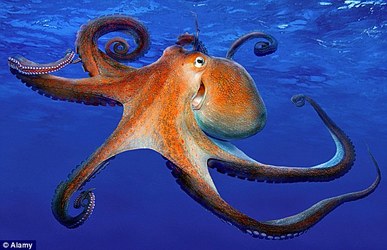 What has eight legs, nine brains, and three hearts? An octopus! I find the octopus absolutely fascinating, they are one of the most intelligent animals in the ocean. Yet, they never get the credit for it. Here is some information on the tentacled fish: - The octopus is classified as mollusk and has no skeletal strucutre but has a skull. -They are usually are 60-90cm long, eight limbs, and an oval shaped head. You can find these creatures in the shallow waters of tropical warm areas. - Their diet consists of worms, fish, crabs, and clams, but how do they eat? They have a toothed tongue (radula) and a beak. They open the shell then drill into it to fill the organism with a poison. Octopodes are very much lonely and are solitairy animals. They make their house in corals and rocks. They toss shells and rocks to hide them. The only time they leave is to hunt or reproduce. Octopodes have so many incredible ways to protect themselves. They have marking to scare away their enemies and dark colours on the suckers, eyes, and arms. Another tactic is to escape they will release ink and push itself through the water as fast 40km! 1) Their tentacles can sense taste. 2) They have blue blood. 3)They can remove a plug or unscrew a lid. 4)The octopus can regenerate a tentacle. 5) Their cells contract to camouflage to change colour and the texture of their skin! Yes, the octopus is weird, but you have to admit it is interesting. 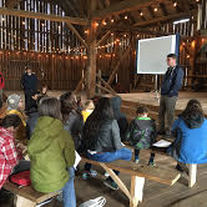 Earth day is such an important reminder to the world to take care of our planet. I was lucky enough to be invited along with three other students from my school, as environmental ambassadors, to an Earth Day celebration at J Steckle Heritage Farms. It was amazing to see so many young Earth advocates. Throughout the day we made organic potato soup, planted trees, and was taught how to compost! At Steckle Farms we learned about the importance of organic and locally grown foods. Also how Ontario farming is being affected by the loss of land. I never realized how important farming is to our planet. Did you know Steckle Farms only use natural fertilizers? This improves soil structures, reduces soil erosion, a rise in crops, and a decline in nutrient loses. There are so many great results because of organic farming. Here is a list of ways farming is making a difference in the environment: 1) Groundwater in areas of agriculture is filled with polluted with fake fertilizers and pesticides. Yet, with organic fertilizers they create enhanced water filtration. 2) Organics systems have better nutrients and diminish the chances of water pollution. 3) Organic agriculture uses renewable energy. 4) It creates massive biodiversity! 5) The incredible taste!  It was wonderful to celebrate Earth Day in such an amazing way, but I decided that I wanted to do more. I choose to keep the lights off and pick up garbage around my neighbourhood. I am so glad that Earth Day is celebrated internationally but hopefully we can make every day Earth Day. From our oceans and sharks, Happy Earth Day! 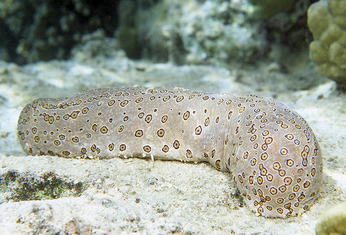 There not for eating, cooking, or scaring cats with. They are strange alien like creatures on the ocean floor! They have some unique features too,that make them extremely different from any other organism. Here is some information about this tubular cucumber: Their scientific name is Holothuroidea and they are in the echinoderm family. They're related to starfish and sea urchins. You can recognize them by there soft leathery skin. They grow from 4-12 inches long. They remind me of ocean caterpillars because their bodies are made of collagen that lets them make their body tight and loose. Many sea cucs live in shallow water on the ocean floor, while others live in the deep ocean. They can be found all over the world! Sea cucumbers are look very peculiar when they eat because they have little tube like tentacles that allow them to digest tiny particles like algae and small marine animals. They break down their food into smaller pieces and then it becomes food for other animals. They are recycling everything back into the ocean! Now thats a green cucumber! The life cycle of these bizarre oceans vegetables begins as eggs. Which soon become larvae for seventy days until they turn into small sea cucumbers. After four long years they become adults and will live for eight more years after that. That is their metamorphosis. I love these marine animals because they have the coolest adaptions that allow them to survive in the oceans. Sea cucs have respiratory trees unlike any other echinoderm. They breathe through arse, and expand and contract their bodies slowly, which brings in the water and shoots it back out. Quite peculiar but impressive. Sea cucumbers have an interesting form of self defense. When they are in danger they will discharge sticky threads to catch their enemies. They will contract their bodies and jet out some of their internal organs. Don't worry, it will all grow back! Others can even contort their bodies to defend themselves. Sea cucumber know how to take care of themselves! Here are some cool facts that I found: 1) Sea cucumbers don't have a brain but a complex nervous system. 2) Sea cucumbers don't have sensory organs, so they can only rely on instinct. 3) Some sea cucs allow tiny fish to enter and leave the arse. 4) Sea cucumbers don't use sound to communicate but they send messages using hormones. 5) Over 1250 species have been classified! Now that we all now a bit more about the sea cucumber we can learn from them and spread the message. Even though they are a bit different and even a bit weird they still deserve to be protected. And who knows, maybe they could help us too? For our oceans, sharks, and, sea cucumbers. Thank you. 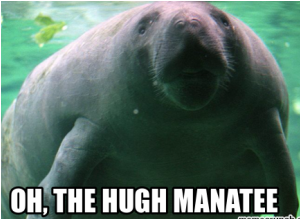 A pun! Finally a pun! As you may have guessed this post is about the elusive but friendly manatee. These peculiar creatures have always fascinated me. Did you know in shallow water they can use their tail to walk? Manatees are interesting animals. Here are some facts to help raise awareness about these quirky creatures: Their scientific name is Trichechus manatus and are in the Trichechidae family. There populations range from North America to the East Coast. They can live for 60-70 year. Thats probably why they have all those wrinkles. Manatees are large mammals and can reach up to 13 feet (4 meters) in length and can weigh 1,300 pounds! These gentle aquatic animals are herbivores and will eat 10-15 % of their body weight each day. That means if one manatee is 1,000 pounds they would eat 100-150 pounds of food daily! No wonder they are so heavy! Manatees are very similar to dolphins and whales. They take breathes often but can stay under the surface for 15 minutes, but when they swim, only three to four minutes. These marine mammals are slow swimmers, but they can also cruise at a stable pace at 5 miles an hour. Luckily they don't have any predators to hide from; except humans. Manatees are threatened mainly due to boating. They are killed when boat propellors hit them. They can die, get seriously injured or infected as a result. This is a serious problem and it up to us to help save them. So lets all lend a fin, and show some hugh- manatee and protect these creatures. For our oceans and sharks, thank you!  Happy new year everyone! Goodbye 2015 and hello 2016! Hooray, its the time of resolutions! I love how everybody makes choices to break bad habits and start new healthy ones. I know that I always struggle to choose just one, but my family decided to make the conscious choice to eat organic healthy foods. I am very excited about this goal because not only will I be able to eat green, but I can act green too. Locally grown foods are great for our planet. Why, might you ask? Well, when you grow organic food they never use pesticides and fertilizers which destroys any chance of water and ground contamination. It also avoids hurting animals since the plants are grown without the use of chemicals and if the organism takes a nibble nothing will affect them. Instead the farmers use a natural solution. Another fantastic advantage is that locally grown foods help stop global warming by reducing carbon emissions. Since you don't have to ship anything and all the food is at your fingertips. Now that you know the facts, you are ready to step in to the world of organic! Here are some tips to stay healthy on a budget 1.Try to buy your grub in season, it costs more to buy fruits in winter than in spring. 2.Try to freeze your goods! Then when buy your foods in season you can eat it organically all year. 3.Discover your inner chef and cook from scratch, this will allow you to know everything your putting in your body. 4. Shop near you! Try and visit your locally farmer’s market where food is inexpensive and organic! 5. Grow it yourself! Try growing your own produce in your own backyard and understand the whole process of cultivation. You don't have start right away, just try one week a month, and see how together we can cultivate a better world. Happy New Year from our Oceans and Sharks! |

Maddie Cranston,
--Ocean Warrior "We never know the worth of water till the well is dry." ~Thomas Fuller, Gnomologia, 1732 Archives
April 2018
Categories
All
|
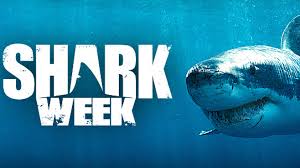
 RSS Feed
RSS Feed
